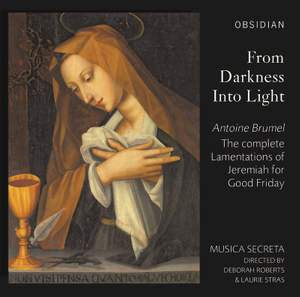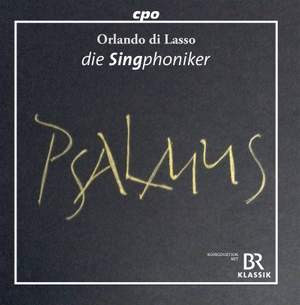Program: #20-09 Air Date: Feb 17, 2020
To listen to this show, you must first LOG IN. If you have already logged in, but you are still seeing this message, please SUBSCRIBE or UPGRADE your subscriber level today.
Lamentations by Antoine Brumel, Psalms by Lassus, and music from Renaissance Prague.
I. Praga Rosa Bohemiae (Cappella Mariana/Vojtěch Semerád). Suprahon CD SU 4273-2.

• The album contains a number of other extraordinary pieces - Josquin Des Prez’s celebrated Stabat Mater, with the added sixth voice, which has been uniquely preserved in this form in Bohemia.
• Cappella Mariana, made up of stellar early music singers (Hana Blažíková, Barbora Kabátková, etc.), have performed Renaissance polyphony to great acclaim.
II. From Darkness Into Light: Antoine Brumel (Musica Secreta/Deborah Roberts & Laurie Stras). Obsidian CD 719.

Brumel’s Lamentations have been known, performed, and recorded for many years in a much abbreviated form of two verses and the refrain, “Jerusalem, convertere." The additional seventeen verses, which which were found hiding in plain sight in a sixteenth-century manuscript by Musica Secreta’s co-director Laurie Stras, reveal a monumental setting that is both intricate in its detail and imposing in its formal construction; a masterpiece brought from darkness into light.
This complete set of Brumel’s Lamentations was preserved for centuries in a manuscript that was not copied for display, nor for a great noble chapel; it has no illuminations, and virtually no composer ascriptions to lead the curious towards its musical treasures. But its copyist, an obscure friar, was a different kind of master, leaving tiny details in the decorations that leap out at the reader like direct messages from the past. He left another manuscript, copied for a Florentine convent, that is filled with tiny inscriptions and portraits of the nuns, and the music it contains gives us a similar aural portrait of the nuns’ daily life. The second half of the disc brings the music of this second manuscript into focus, with gems by Josquin des Prez and Loyset Compère sitting alongside the anonymous beauty of works that decorated the nuns’ worship throughout the year.
When Professor Laurie Stras, co-director of the early music female vocal ensemble Musica Secreta, came across a collection of settings of Lamentations in Florence's Biblioteca Nazionale, it was not immediately clear that what she had in her hands was the complete score of Antoine Brumel's Lamentations of Jeremiah for Good Friday.
Brumel's Lamentations allude to the Tenebrae (Lat. darkness) services in which verses from the biblical Lamentations of Jeremiah were intoned. Central to the Tenebrae is the belief that the most forbidding darkness can still be pierced by light. Brumel’s work is akin to a vast painting or tableau vivant telling the tragedy of the destruction of a city as seen through the eyes of Christ on the cross in a way that is both completely personal and at the same time universal.
The symphonic proportions of the five 'acts' totalling approximately forty-five minutes, make the composition both impressive and unique in Renaissance repertoire. The Lamentations have no apparent liturgical function but, are likely to have been composed for performance during Holy Week, when every Christian worshipper would re-live the story of Christ's last days through the Tenebrae liturgy.
For the recording, Musica Secreta have paired Brumel's Lamentations with a collection of vocal music copied by Fra Antonio Moro, the same monk who was responsible for copying the Lamentations. Compiled for a Florentine nunnery, the Biffoli-Sostegni manuscript belonged to two nuns: Suor Agnoleta Biffoli and Suor Clemenzia Sostegni whose names can be found both on the book binding and embedded in its extensive decorations. The manuscript documents the entire liturgical year of a convent in 76 works of which only nine - including Moro's own Sancta Maria succurre miseris – can be attributed.
Anonymous - Ave Maris Stella
Josquin des Prez - Recordare virgo Mater
Antonio Moro - Sancta Maria succurre miseris
Anon - Jesus autem cum ieiunasset
Anon - Multiplicati sunt qui tribulant me
Loyset Compere - Parnymphus salutat virginem
Anon - Verbum caro factum est
Anon - Salve Regina
III. Orlando di Lasso—Psalmus (die Singphoniker). CPO CD 555.264-2.

CD 1:
- Psalmus I - IV
- 1Primus Psalmus
- 2Secundus Psalmus
- 3Tertius Psalmus
- 4Quartus Psalmus
CD 2:
- Psalmus V - VII & Laudes Domini
- 1Quintus Psalmus
- 2Sextus Psalmus
- 3Septimus Psalmus
- 4Laudes Domini
Composer Info
Petrus Wilhelmi de Grudencz (1392-after 1452), Heinrich Isaac (1450-1517), Jacob Obrecht (1457/8-1505), Johannes Tourout (ca 1450-1480), Josquin Des Prez (1450/55-1521), Lupus Hellinck (1493/94-1541), Pierre de Bonhomme (ca 1555-1617), Jacobus Regnart (1540/45-1599), Kryštof Harant (1564-1621), Jan Sixt of Lerchenfels (ca 1550-1629), Antoine Brumel (c. 1460–1512 or 1513), Antonio Moro, Loyset Compere, Orlando di Lasso
CD Info
Suprahon CD SU 4273-2, Obsidian CD 719, CPO CD 555.264-2